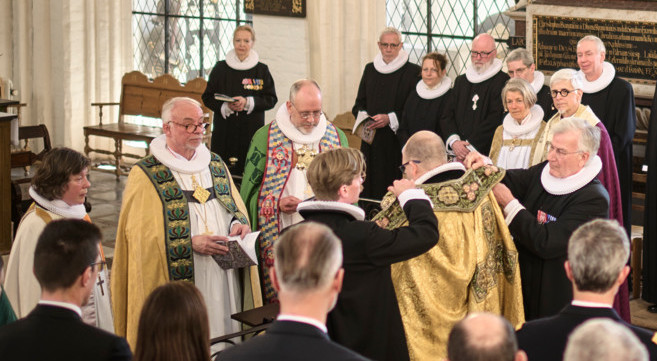Denmark Contemplates New Legislation in Wake of Quran Burnings
In the wake of highly controversial Quran burnings in Denmark over the summer, the Danish government has introduced a legislative proposal titled 'Prohibition of improper treatment of objects with significant religious significance to a religious community'.

Foto: Ard Jongsma / folkekirken.dk
The proposed legislation is aimed at criminalizing actions that are seen as improper treatment of objects considered sacred by religious communities. The Quran burnings not only ignited a fire but also cast Denmark in an unfavorable light on the global stage, particularly in the Muslim world.
The legislative intervention, which is currently under discussion and scrutiny, seeks to address the issue by establishing legal protections for objects with significant religious significance. However, the proposal has sparked significant debate and criticism, particularly from the country's religious leaders.
Criticism from Bishops
Nine out of ten bishops in Denmark have signed a document criticizing the rushed processing of the legislative proposal and its imprecise wording. In their response, the bishops assert that proposals of this nature require a more comprehensive consultation process to encompass a wide array of perspectives on an issue that touches upon fundamental questions.
One major concern expressed by the bishops is the vague definition of "improper" treatment and the uncertainty surrounding which objects fall under the purview of this law. The imprecise definition of "improper" has the potential to create ambiguity among citizens about which actions may be subject to punishment, according to the bishops.
While there is a consensus among the bishops that Quran burnings are unacceptable, they are divided on whether new legislation is required to address this issue. Their differences of opinion underline the complexities of striking the right balance between safeguarding religious symbols and upholding the principle of freedom of expression.
A Diverse Range of Opinions
Some bishops support the potential ban, arguing that burning religious texts is not an expression of free speech. For example, Peter Birch, the Bishop of the Helsingør Diocese, supports the proposed law and calls for it to ensure space for criticism of religion, political expressions, and artistic expressions. He believes that objects of significant religious significance should be protected in a manner similar to how the flags of nations are protected.
Henrik Stubkjær, the Bishop of the Viborg Diocese, concurs with the need for a potential ban and suggests the reintroduction of a blasphemy law. He contends that freedom of expression is a fundamental right that needs to be protected, but there should be limits on expressions used for mockery.
In contrast, other bishops believe that Denmark's existing laws are sufficient to prevent actions like Quran burnings. Thomas Reinholdt Rasmussen, the Bishop of the Aalborg Diocese, expressed concerns that a ban could lead to a restriction of freedom of expression and a limitation of the right to criticize religions. He believes that Danish society already allows for actions like Quran burnings, however morally reprehensible they may be.
Elof Westergaard, the Bishop of the Ribe Diocese, shares similar sentiments, emphasizing that new legislation should not be hastily made due to external pressure. He is concerned that legislating in response to external pressure may lead to an ongoing cycle of restrictions on freedom of expression.
Henrik Wigh-Poulsen, the Bishop of the Aarhus Diocese, hopes for a pragmatic solution that balances political considerations with the importance of freedom of expression.
Two Bishops Offer Nuanced Views
Two bishops, Marianne Gaarden and Mads Davidsen, offer other perspectives. Marianne Gaarden, the Bishop of the Lolland-Falsters Diocese, believes that a potential ban on burning religious texts would not threaten freedom of expression but instead emphasizes the importance of democratic discourse. She argues that democratic dialogue is the appropriate way to challenge political and religious beliefs different from one's own.
Mads Davidsen, the Bishop of the Fyn Diocese, does not expressly call for a ban but underscores that it is not the church's role to legislate. He reminds politicians of the need to find a balance between religious freedom and the right to express oneself freely while respecting other religions.
Conclusion
The legislative proposal introduced in Denmark to address the improper treatment of objects with significant religious significance is generating significant debate. The differing opinions among the country's bishops highlight the complexities of finding a solution that balances the protection of sacred objects with the principles of freedom of expression.
An updated bill has now been introduced and will be debated soon in the parliament.


